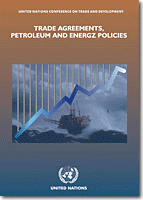
In the late 1990s a group of petroleum-producing developing countries requested UNCTAD´s support to examine the implications of WTO membership for trade in petroleum and petroleum products. In response to this challenging appeal, the UNCTAD secretariat held a number of meetings with the representatives of the interested countries and several experts and prepared this book which reflects the active discussions it carried out as well as the main findings of its analytical work. The book is addressed to a broad range of countries and not exclusively to petroleum-exporting countries, since it also looks at such issues as trade in energy services, environmental protection and national security.I believe that the launch of this publication also represents an excellent occasion for an exchange of views through an informal round table on the interlinkages between energy, international trade and the development perspectives of developing countries. The industrial world is better placed now than in the 1970s and 1980s to make the necessary adjustments to unexpected rise in oil prices. For oil-importing developing countries, particularly the least developed countries, however, which face the burden of a rising import bill, active responses should be sought. For petroleum-producing countries the challenge is to preserve their ability to use their natural energy resources to promote their development. The implications of further trade liberalization in the energy services sector should be explored from the view points of development, efficient use of natural resources and environmental protection. Over the longer term, the challenge is to create a truly global and participatory approach to managing the world´s non-renewable resources.Mr. Rubens RicuperoSecretary-General of UNCTAD


